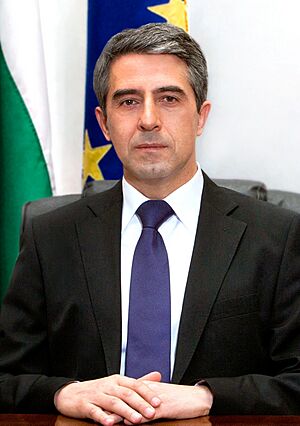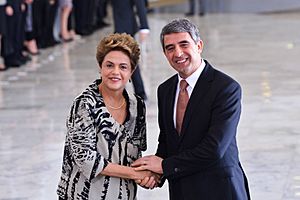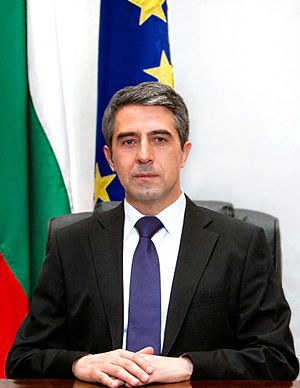Rosen Plevneliev facts for kids
Quick facts for kids
Rosen Plevneliev
|
|
|---|---|
| Росен Плевнелиев | |

Official portrait, 2012
|
|
| 4th President of Bulgaria | |
| In office 22 January 2012 – 22 January 2017 |
|
| Prime Minister |
See list
|
| Vice President | Margarita Popova |
| Preceded by | Georgi Parvanov |
| Succeeded by | Rumen Radev |
| Minister of Regional Development and Public Works |
|
| In office 27 July 2009 – 9 September 2011 |
|
| Prime Minister | Boyko Borisov |
| Preceded by | Asen Gagauzov |
| Succeeded by | Lilyana Pavlova |
| Personal details | |
| Born |
Rosen Asenov Plevneliev
14 May 1964 Gotse Delchev, PR Bulgaria |
| Political party | Independent (since 1989) |
| Other political affiliations |
|
| Spouses |
Veronika Kavrakova
(divorced)Yuliyana Plevnelieva
(m. 2000; div. 2017)Desislava Banova
(m. 2018) |
| Children | Phillip, Asen, Pavel, Yoan |
| Alma mater | Technical University, Sofia |
| Occupation |
|
| Awards | Order of the Southern Cross |
Rosen Asenov Plevneliev (Bulgarian: Росен Асенов Плевнелиев, born on May 14, 1964) is a Bulgarian politician. He served as the 4th President of Bulgaria from 2012 to 2017. Before becoming president, he was the Minister of Regional Development and Public Works from 2009 to 2011. He was part of the GERB political party.
Contents
About Rosen Plevneliev
Early Life and Education
Rosen Plevneliev was born in Gotse Delchev, Bulgaria. His mother, Slavka Plevnelieva, was a teacher. His father, Asen Plevneliev, was involved with the Communist Party. When Rosen was 10, his family moved to Blagoevgrad. His family's ancestors were Bulgarians from the Macedonia region. They moved to Bulgaria in 1913. The name Plevneliev comes from the village of Plevnya, which means "barn."
Plevneliev finished high school in Blagoevgrad in 1982. In 1989, he graduated from the Higher Mechanical-Electrotechnical Institute in Sofia. He then became a researcher at an institute in Pravets. While at university, he was a member of the Komsomol, a youth organization.
Starting a Business
After big political changes in 1990, Plevneliev started his own construction company in Bulgaria. His company worked on many projects. One of the most notable projects was building the Sofia Business Park.
Family Life
Rosen Plevneliev was married to journalist Yuliyana Plevnelieva from 2000 until 2017. They had three sons: Filip, Asen, and Pavel. He also has another son, Yoan. Besides his native Bulgarian, he can speak English and German very well.
Political Journey
Becoming a Minister




On July 27, 2009, Plevneliev became the Minister of Regional Development and Public Works. He was known as one of the "reformers" in the government. This meant he wanted to make important changes to how things were done.
President of Bulgaria
On September 4, 2011, Plevneliev was chosen as the candidate for President of Bulgaria by the GERB party. He won the presidential election on October 30, 2011. He received more than half of the votes in the second round. He officially became president on January 22, 2012. He took over from the previous president, Georgi Parvanov.
As president, his main goals included improving how the government worked. He also wanted to make Bulgaria more energy efficient and independent.
Challenges and Caretaker Governments
In 2013, there were protests in Bulgaria about high electricity prices. Because of these protests, the government resigned. President Plevneliev then had to appoint a special "caretaker government." This is a temporary government that manages the country until a new official government can be formed. He appointed Marin Raykov as the Prime Minister of this temporary government.
Later in 2013, there were more protests. These protests were about powerful groups influencing politics. Plevneliev started an initiative called 'Dialogue with citizens.' This involved public discussions about the economy, the justice system, and media freedom.
In August 2014, Plevneliev appointed another caretaker government, led by Georgi Bliznashki. This made him the first Bulgarian president to appoint more than one temporary government.
International Relations
Plevneliev supported stronger connections between Bulgaria and China. He also often spoke about the immigration rules in the UK.
Recent Activities
In October 2022, Plevneliev was asked by the GERB party to lead a group. This group was formed to discuss creating a new government. He accepted this role. The group met with many pro-European and democratic parties. However, they could not reach an agreement.
In September 2023, Plevneliev, along with other public figures, made a statement. They suggested that Bulgaria's membership in the European Union (EU) and NATO should be written into the Constitution of Bulgaria.
Awards and Honours
Rosen Plevneliev has received many awards from different countries for his service. These include:
 Greece: Grand Collar of the Order of the Redeemer (2012)
Greece: Grand Collar of the Order of the Redeemer (2012) Poland: Order of the White Eagle (2014)
Poland: Order of the White Eagle (2014) Portugal: Grand Collar of the Order of Prince Henry (2015)
Portugal: Grand Collar of the Order of Prince Henry (2015) Slovakia: Grand Cross of the Order of the White Double Cross (2015)
Slovakia: Grand Cross of the Order of the White Double Cross (2015) Brazil: Grand Collar of the Order of the Southern Cross (2016)
Brazil: Grand Collar of the Order of the Southern Cross (2016) Cyprus: Grand Collar of the Order of Makarios III (2016)
Cyprus: Grand Collar of the Order of Makarios III (2016) Austria: Grand Star of the Decoration of Honour for Services to the Republic of Austria (2016)
Austria: Grand Star of the Decoration of Honour for Services to the Republic of Austria (2016) Albania: Honor of the Nation Decoration (2016)
Albania: Honor of the Nation Decoration (2016) Germany: Grand Cross Special Class of the Order of Merit of the Federal Republic of Germany (2016)
Germany: Grand Cross Special Class of the Order of Merit of the Federal Republic of Germany (2016) Ukraine: First Class of the Order of Prince Yaroslav the Wise (2016)
Ukraine: First Class of the Order of Prince Yaroslav the Wise (2016) Slovenia: Order for Exceptional Merits (2016)
Slovenia: Order for Exceptional Merits (2016) Italy: Knight Grand Cross with Collar of the Order of Merit of the Italian Republic (2016)
Italy: Knight Grand Cross with Collar of the Order of Merit of the Italian Republic (2016) Croatia: Grand Order of King Tomislav (2016)
Croatia: Grand Order of King Tomislav (2016) Moldova: Order of the Republic (2016)
Moldova: Order of the Republic (2016) Hungary: Grand Cross with Chain of the Hungarian Order of Merit (2016)
Hungary: Grand Cross with Chain of the Hungarian Order of Merit (2016) Romania: Collar of the Order of the Star of Romania (2016)
Romania: Collar of the Order of the Star of Romania (2016) Malta: Companion of Honour of the National Order of Merit (2016)
Malta: Companion of Honour of the National Order of Merit (2016) Montenegro: Grand Cross of the Order of the Republic of Montenegro (2016)
Montenegro: Grand Cross of the Order of the Republic of Montenegro (2016)- House of Habsburg-Lorraine: Order of St. George
 France: Commander of the Legion of Honour (2018)
France: Commander of the Legion of Honour (2018)
See also
 In Spanish: Rosen Plevneliev para niños
In Spanish: Rosen Plevneliev para niños
 | DeHart Hubbard |
 | Wilma Rudolph |
 | Jesse Owens |
 | Jackie Joyner-Kersee |
 | Major Taylor |


